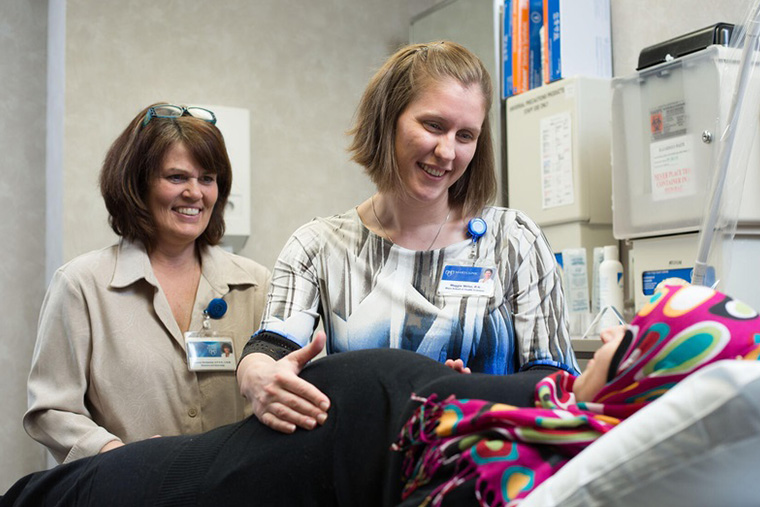What Makes Our Program Distinct?
State-of-the-art simulation facilities and clinical settings offer unparalleled clinical opportunities
Set in a progressive health care community with a rich diversity of well-established midwifery practices, our program offers unparalleled clinical opportunities. State-of-the-art simulation facilities complement excellent clinical settings. Students participate in interprofessional clinical and simulation activities with OBGYN residents at the University of Minnesota.
The primarily online curriculum combined with scheduled in-person and online synchronous sessions and committed faculty allow for flexible learning.
Coursework that prepares leaders
Midwifery students gain valuable clinical skills and knowledge in their coursework. Courses in pharmacology, pharmacotherapeutics, physiology, pathophysiology, and health assessment are the building blocks to five semesters of midwifery specific courses. All midwifery students are required to complete a course on racism and health disparity prevention specific to the midwifery profession.
Through coursework in informatics, economics, evidence-based practice, policy, and completion of a quality improvement project, graduates are prepared to affect change within their clinical environment and those interested may take on formal leadership positions.
Midwifery students have the opportunity to enroll in additional courses to earn a Certificate in Integrative Therapies and Healing Practices or Human Sexuality. There are also options to add a minor in Public Health, American Indian Public Health and Wellness, Gerontology, Global Health, Health Equity, Population Studies, and Human Rights.
Our Graduates are Prepared to:
- provide independent, competent and professional midwifery care, according to the ACNM Philosophy, Core Competencies, Standards for Practice, Code of Ethics, ACNM Position Statement on Racism and Racial Bias;
- practice interprofessionally in providing and evaluating health care;
- collaborate with physicians in the care of women/individuals with medical and/or obstetrical complications;
- assume the role and responsibilities of the nurse-midwife which include the following:
- provide a culturally sensitive, culturally responsive, equitable and integrative approach to care;
- promote a physiologic and low intervention approach to health care;
- provide leadership in improving the quality of health care;
- promote evidenced-based practice through research and evaluation;
- participate in current health care legislation and policy affecting individuals and families;
- implement strategies to improve the organization of health care services.
- describe the history of the US and global midwifery profession and its impact on contemporary practice and policy.
Certification
Upon successful completion of the midwifery course of study, graduates are eligible to take the American Midwifery Certification Board (AMCB) national certification examination.
Accreditation
The midwifery program at the University of Minnesota, School of Nursing is fully accredited by the Accreditation Commission for Midwifery Education (ACME), 2000 Duke Street, Suite 300, Alexandria, Virginia 22314; (703) 835-4565; asmith@theacme.org support@theacme.org theacme.org. For information about accreditation please contact ACME directly.

